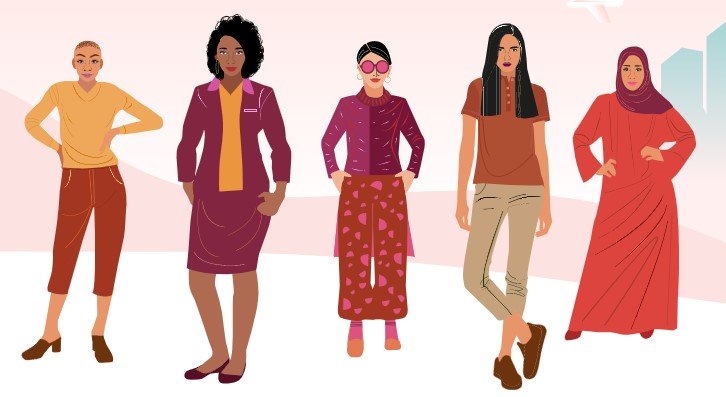
Part of our mission at White Dress Project is to
educate.Being informed about your condition and treatment options is critical to self-advocacy.
Uterine Fibroids Patient Bill of Rights
Fibroids Affect Most Women—But That Doesn’t Mean You’re Powerless.
Did you know that 90% of Black women and 70% of white women will be diagnosed with fibroids by age 50? Don’t wait to take charge of your health.
Download our FREE Uterine Fibroids Patient Bill of Rights—a powerful guide to help you know your options, speak up, and advocate for the care you deserve.
Fibroids Are Common. Being Informed Should Be Too.
Heal & Thrive E-Book
Heal & Thrive: FUNCTIONAL MOVEMENTS AND LIFESTYLE
TIPS FOR POST-FIBROID SURGERY with Anowa Adjah
Our first e-book of our Heal and Thrive series, featuring renowned fitness trainer and fellow Fibroid warrior, Anowa Adjah, is designed to help women safely rehab their bodies after surgery with functional movements and healthy lifestyle tips. This essential guide includes a post-surgery checklist linked to our curated Amazon store, ensuring you have everything you need for a smooth recovery. Plus, enjoy a special discount to continue training with Anowa and keep building strength beyond surgery.
Whether you're recovering yourself or gifting it to someone who is, this e-book empowers women to heal, thrive, and live healthier lives. Every download supports The White Dress Project's mission to aid women through their recovery journey.
Pay what you wish today and take the first step to recovery!
Uterine Health Guide
In partnership with Pfizer, we have developed the Uterine Health Guide. Although more than 800 million people around the world have their period on any given day, periods can still be hard to talk about openly. It’s important to recognize red flags when it comes to your period and uterine health.
Your Uterine Health Guide is here to help you better understand it all.
Uterine Fibroids Toolkit: A Patient Empowerment Guide
While an estimated 26 million women ages 15-50 in United States have uterine fibroids, these statistics about fibroids are often underestimated.
Uterine fibroids (leiomyomas) are tumors made of smooth muscle and fibrous connective tissue that arise from the uterus and are one of the most common gynecological conditions nationwide.
Fibroids can develop in any girl or woman after the onset of her menstrual cycle. Although fibroids are most commonly diagnosed in individuals in their 30s and 40s, they can occur in adolescents and postmenopausal women, particularly those using hormone therapy. Fibroids tend to increase during the reproductive years and then shrink after menopause. These growths are non-malignant and are not associated with an increased risk of uterine cancer, but they can result in mild to severe side effects and can affect one’s quality of life.
The White Dress Project has partnered with the Society for Women’s Heath Research to create a toolkit designed to empower individuals with uterine fibroids in navigating their care.
The toolkit provides easy-to-understand information on gynecological health, guidance on uterine fibroid diagnosis and treatment, and tips for interacting with your health care provider. The toolkit aims to facilitate productive conversations between patients and health care providers so people with uterine fibroids can get the care they need.
What’s Normal When It Comes to Menstrual Bleeding?
Is your heavy period normal, or could it be a symptom of something else? Heavy menstrual bleeding is one of the most common problems women report to their healthcare providers — and many more cases may be unreported because women don’t realize anything is wrong.
Many women assume heavy bleeding is normal, but it could be a symptom of uterine fibroids.
Uterine fibroids are:
Muscular growths of the uterus
Benign (non-cancerous)
Linked to health problems such as pelvic pain, anemia (low iron) and infertility
What Are My Treatment Options for Uterine Fibroids?
1 in 5 U.S. women believe that the only treatment for fibroids is a hysterectomy. Hysterectomies used to be the only treatment option for fibroids. Thanks to medical advances, there are new options. Treatment is not a one size fits all approach. Talk to your HCP about your symptoms, fertility and treatment goals, location, and size of the fibroids to see what options are available for your situation!
Our Education Programs
Dialogue with the Doctors
Dialogue with the Doctors is one of our signature educational series that connects patients from our community to physicians across the country who are leaders in their fields. This series creates a safe space for our community to tell their stories, ask physicians questions about any aspect of their journey, and breaks down the walls of silence around fibroids.
Taboo Talks
Taboo Talk is an educational event where we bring together patients, advocates, and physicians to discuss fibroids and other gynecological disorders with a goal of normalizing conversations around these conditions so that people will no longer feel like they have to suffer in silence.
Louder than Fibroids
Louder than Fibroids is an educational and awareness campaign dedicated to amplifying the voices, stories,and experiences of those struggling with fibroids.
Dialogue with the Doctors - March 2021
Our Crisis: What’s Being Done to Save Our Uterus?
Understanding Health Disparities and the Research Gaps
Suffering in Silence
This discussion, hosted by the Black Women's Health Imperative during Fibroid Awareness Month, focused on the disproportionate burden of fibroids on African-American women, unmet medical needs, health disparities and more!









